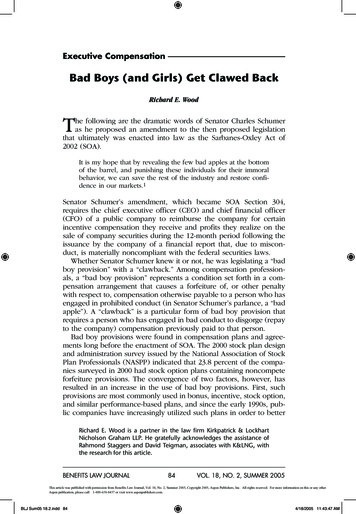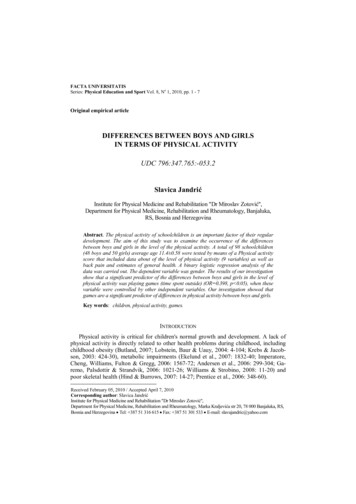
Transcription
Executive CompensationBad Boys (and Girls) Get Clawed BackRichard E. WoodThe following are the dramatic words of Senator Charles Schumeras he proposed an amendment to the then proposed legislationthat ultimately was enacted into law as the Sarbanes-Oxley Act of2002 (SOA).It is my hope that by revealing the few bad apples at the bottomof the barrel, and punishing these individuals for their immoralbehavior, we can save the rest of the industry and restore confidence in our markets.1Senator Schumer’s amendment, which became SOA Section 304,requires the chief executive officer (CEO) and chief financial officer(CFO) of a public company to reimburse the company for certainincentive compensation they receive and profits they realize on thesale of company securities during the 12-month period following theissuance by the company of a financial report that, due to misconduct, is materially noncompliant with the federal securities laws.Whether Senator Schumer knew it or not, he was legislating a “badboy provision” with a “clawback.” Among compensation professionals, a “bad boy provision” represents a condition set forth in a compensation arrangement that causes a forfeiture of, or other penaltywith respect to, compensation otherwise payable to a person who hasengaged in prohibited conduct (in Senator Schumer’s parlance, a “badapple”). A “clawback” is a particular form of bad boy provision thatrequires a person who has engaged in bad conduct to disgorge (repayto the company) compensation previously paid to that person.Bad boy provisions were found in compensation plans and agreements long before the enactment of SOA. The 2000 stock plan designand administration survey issued by the National Association of StockPlan Professionals (NASPP) indicated that 23.8 percent of the companies surveyed in 2000 had stock option plans containing noncompeteforfeiture provisions. The convergence of two factors, however, hasresulted in an increase in the use of bad boy provisions. First, suchprovisions are most commonly used in bonus, incentive, stock option,and similar performance-based plans, and since the early 1990s, public companies have increasingly utilized such plans in order to betterRichard E. Wood is a partner in the law firm Kirkpatrick & LockhartNicholson Graham LLP. He gratefully acknowledges the assistance ofRahmond Staggers and David Teigman, associates with K&LNG, withthe research for this article.BENEFITS LAW JOURNAL84VOL. 18, NO. 2, SUMMER 2005This article was published with permission from Benefits Law Journal, Vol. 18, No. 2, Summer 2005, Copyright 2005, Aspen Publishers, Inc. All rights reserved. For more information on this or any otherAspen publication, please call 1-800-638-8437 or visit www.aspenpublishers.com.BLJ Sum05 18.2.indd 844/18/2005 11:43:47 AM
Executive Compensationalign the financial interests of executives with those of the company’sshareholders. Second, the spate of highly publicized corporate scandals in recent years has focused attention on bad boy provisions as apossible weapon in the arsenal of proponents of good corporate governance. This column reviews the design of bad boy and clawbackprovisions and briefly explores issues relating to the enforceability ofsuch provisions.Purpose and Design of Bad Boyand Clawback ProvisionsBefore companies began to regularly include bad boy provisions intheir compensation plans, they were not necessarily without recoursein the event of an executive’s misconduct. For example, the commonlaw has long recognized that an employee is obliged to exercise theutmost good faith in his dealings with the employer and that theemployee may forfeit the right to compensation if he or she does notlive up to that standard of conduct:If the agent does not conduct himself with entire fidelity towardhis [employer], but is guilty of taking a secret profit or commission in regard to the matter in which he is employed, he loses hisright to compensation on the ground that he has taken a positionwholly inconsistent with that of agent for his employer, and [that]gives his employer, upon discovering it, the right to treat him sofar as compensation, at least, is concerned, as if no agency hadexisted. This may operate to give the principal the benefit ofvaluable services rendered by the agent, but the agent has onlyhimself to blame for that result.2In addition to providing that the miscreant employee may lose hisright to compensation, the common law has also provided employerswith a noncontractual clawback right under certain circumstances.Restitution and disgorgement are well-established equitable remediesthat may permit recovery from a wrongdoer in some situations. Whilethese terms are sometimes used interchangeably, restitution and disgorgement are distinct legal concepts. Restitution is intended to makean injured party whole while disgorgement is intended to divest thewrongdoer of amounts he or she has been unjustly awarded.3 Ingeneral, an employer may recover salary, bonus, or other compensation paid to an employee if it is determined that payment of thecompensation was induced by the employee’s fraud or that duringthe course of his employment, the employee violated his express orimplied obligations to the employer by fraud or disloyalty. Courts,however, will refuse to require restitution of compensation, even inclear cases of breach of trust by corporate officers, where it would beinequitable to do so.BENEFITS LAW JOURNALBLJ Sum05 18.2.indd 8585VOL. 18, NO. 2, SUMMER 20054/18/2005 11:43:48 AM
Executive CompensationCorporate officers not only have potential exposure under the common law, but they also have statutory duties of loyalty, prudence, andgood faith to their companies and may be subject to civil liability forbreach of these statutory obligations.4 This liability may include, forexample, accountability to the corporation for profits made in breachof the officer’s duty of loyalty.5 SOA Section 304, discussed furtherbelow, offers an additional statutory remedy to public companiesunder limited circumstances.An increasing number of companies, however, are choosing notto rely on these somewhat limited common law theories and statutory provisions and are seeking to protect themselves contractually.Bad boy forfeiture and disgorgement provisions are intended to discourage executives from engaging in specified conduct against theemployer’s interest and to provide the company a clear contractualremedy in the event of a breach of the stated standard of conduct.A number of different approaches can be taken to the design ofbad boy clauses and clawback provisions as part of compensationplans and arrangements. The following are some of the key considerations in drafting such provisions.Compensation Arrangements Typically CoveredExecutive compensation packages are often viewed as consistingof three basic components: (1) base salary, (2) short-term incentives,and (3) long-term incentives. For the purposes of this analysis, afourth compensation category, executive severance benefits, will beconsidered. Bad boy provisions commonly may be found in all ofthese categories of executive compensation other than base salary.While it is conceivable that base salary could be made contractuallysubject to forfeiture or repayment in the event of executive misconduct, such contractual arrangements are rare. It is not unusual, however, for a company to seek repayment of base salary as an equitableremedy in a lawsuit involving allegations of serious acts of misconduct or disloyalty on the part of an executive, and it is possible thatbroader bad boy provisions covering salary will be found in executiveemployment agreements of the future.Short-term incentive arrangements, such as annual bonus plans, areoften structured to condition eligibility for payment on some measure,among other things, of the executive’s conduct. For example, a bonusplan might require an executive to achieve an individual performancerating of “satisfactory” or above for one year in order to be eligiblefor an annual bonus for that year. Such requirements are less common in plans for executive officers than in plans for lower-rankingemployees. Contractual clawback provisions, requiring the repayment of bonuses already received by an executive in the event of theexecutive’s misconduct, have sometimes been included in executiveBENEFITS LAW JOURNALBLJ Sum05 18.2.indd 8686VOL. 18, NO. 2, SUMMER 20054/18/2005 11:43:48 AM
Executive Compensationbonus plans and can be expected to be used more frequently in thefuture, especially if reports of large executive bonuses “earned” onthe basis of faulty financial data continue to proliferate.Bad boy provisions and clawbacks have most commonly beenused in long-term incentive plans, such as stock options, performanceawards, and restricted stock programs. Such plans are potentially verylucrative for executives and participation in such programs is commonly viewed as a special privilege that should not be extended tothose who have engaged in misconduct at the company’s expense.Executive severance plans and agreements often provide for payment of severance benefits over a specified period of weeks, months,or years, and the eligibility of an executive to receive such benefitsis frequently conditioned on his or her compliance with a specifiedstandard of conduct, such as an agreement not to compete with orto not disparage the company. Some companies include additionalconditions on severance payments, such as a requirement that theexecutive has not committed fraud or otherwise violated the federalsecurities laws.Conduct ProhibitedThe following are types of conduct prohibited under the compensation arrangements discussed.Competition or Other Disloyal ConductMany companies enter into restrictive covenant agreements withexecutives that obligate the executives to protect the company’s confidential information and prohibit the executive from competing withor disparaging the company or soliciting the company’s employees orcustomers. Such covenants apply during the entire term of employment and often for a stated period of time after the end of the employment term. Confidentiality and nondisparagement covenants typicallycontinue to apply indefinitely following termination of employmentwhile noncompete and nonsolicitation covenants generally continuefor a fixed period of time, usually from one to three years after termination of employment.In many cases, the company’s preferred remedy for a violation ofsuch a restrictive covenant is specific enforcement, i.e., an injunction against the executive or former executive restraining him or herfrom engaging in the prohibited conduct. In addition, compensationentitlements may be conditioned on compliance with such covenants.As discussed below, however, it is not clear that such dual remediescan peacefully co-exist in all circumstances.BENEFITS LAW JOURNALBLJ Sum05 18.2.indd 8787VOL. 18, NO. 2, SUMMER 20054/18/2005 11:43:49 AM
Executive CompensationFraud or Other Securities Law ViolationsSerious misconduct on the part of corporate officers can take avariety of other forms, including but not limited to fraud, negligentor intentional misrepresentations, malfeasance, misappropriation ordiversion of corporate assets or business opportunities, acts of disloyalty, and the commission of illegal acts. Forfeiture and clawbackprovisions in compensation plans can be designed to cover any andall such acts.Other Conduct Detrimental to the CompanyOccasionally bad boy provisions include a “catch-all” category forany conduct not in the company’s best interests. Given its somewhatsubjective nature, such a provision should be carefully drafted inorder to avoid inequitable results.Forfeiture or DisgorgementThe consequence of an executive’s violation of a contractual badboy provision may be forfeiture of as yet unpaid compensation, anobligation to disgorge (repay) compensation previously received (aclawback), or both forfeiture and clawback. While forfeiture provisions may be more defensible than clawbacks on equitable grounds,the presence of a forfeiture clause may not be particularly helpful asa practical matter if the detrimental conduct remains undiscovered fora period of time. Alternatively, the forfeiture provision may merelypostpone the detrimental conduct for a period of time until the compensation is paid. In contrast, a clawback provision may actually givepause to a departed executive who is considering joining a competitor or engaging in other prohibited conduct, and, in the event of anactual breach, provide the company with a possible remedy wherebad conduct that occurred during employment comes to light onlyafter the executive’s termination or if the conduct does not begin untilafter termination.Time Period When the Restriction AppliesAs suggested above, forfeiture conditions apply only if the prohibited conduct occurs and is discovered before the compensation ispaid. While clawback provisions can potentially be applicable for anindefinite period of time, as a matter of fairness it is typical for suchprovisions to apply for a period of one to three years following termination of the executive’s employment. Even the disgorgement provisions of SOA Section 304, about which more is said below, apply onlyBENEFITS LAW JOURNALBLJ Sum05 18.2.indd 8888VOL. 18, NO. 2, SUMMER 20054/18/2005 11:43:49 AM
Executive Compensationto incentive compensation paid and profits on the sale of companysecurities realized during the 12-month period following the issuanceby the company of a noncompliant financial report.The Legality and Enforceability of Bad Boy ProvisionsCourts tend to view compensation plans and arrangements as contractual in nature even if they are not formally documented as contracts. Under contract law, courts generally have a duty to construeand enforce the meaning and intention of the parties to a contract.If a bad boy provision is included in a compensation contract, thenthe courts should give full effect to that provision—subject, of course,to the usual defenses to the enforcement of contracts, such as fraud,duress, mistake, and unconscionability. Many such defenses aredependent on the facts of the particular case, however, and may notbe broadly applicable in litigation with respect to bad boy provisions.The discussion below addresses some of the defenses that may beapplicable in the context of an employer’s attempt to enforce a badboy provision in a compensation contract.WaiverIn the course of negotiating the terms of an executive’s separationfrom employment, companies are frequently asked by the departingexecutive or his or her legal counsel to agree to release the executivefrom any claims the company and its shareholders may have againstthe executive (just as the company requests, almost invariably, thatthe executive release the company from all claims, including thosefor various forms of employment discrimination). Any such release bythe company may limit the remedies the company might otherwisehave had under a contractual clawback provision in a compensationcontract as well as any common law remedies of the company in theevent it is determined that the executive engaged in serious misconduct. It appears, however, that such a release would not be effectivewith respect to any claims the company may have against the formerexecutive under SOA Section 304.6Illegality and Violation of Public PolicySeveral courts have considered whether bad boy provisions incompensation contracts could be invalidated as being opposed topublic policy either by operation of an express statutory prohibitionor by operation of common law.BENEFITS LAW JOURNALBLJ Sum05 18.2.indd 8989VOL. 18, NO. 2, SUMMER 20054/18/2005 11:43:49 AM
Executive CompensationRestraint of TradeOne important public policy that may be implicated by restrictive provisions in compensation contracts is the prohibition againstrestraints of trade. For many centuries, contracts that restricted aparty’s ability to find gainful employment were held to be illegal perse as restraints of trade. Under the modern rule, however, the legality of restrictive covenants generally hinges on whether the particularrestraint is reasonable under the facts and circumstances of the particular case. A noncompete or similar restriction in a compensationcontract could be considered an illegal restraint of trade if it is notreasonable in scope and is ancillary to an otherwise enforceableagreement.The legality of a clawback tied to a noncompete obligation was oneof several issues explored in International Business Machines Corp. v.Bajorek.7 Dr. Christopher Bajorek was an executive at IBM for over 25years. During his employment, Bajorek received stock options fromIBM as part of his compensation. The applicable stock option agreement contained a noncompete clause that required Bajorek to repayany option gain to IBM in the event that he worked for a competitorwithin six months of exercising the options. The option contract alsocontained a New York choice of law provision. Bajorek exercised hisstock options, realizing a gain in excess of 900,000, and within sixmonths of the option exercise he left his employment with IBM andbegan to work for a competitor. IBM notified Bajorek that his optionswere canceled and that he was obligated to repay the related optiongain to IBM.Bajorek filed an action in California, his state of residence, seekinga declaratory judgment that the noncompete provision in his optioncontract was not enforceable under California law. IBM filed an actionin New York state court for breach of contract and fraudulent misrepresentation. The actions were transferred and consolidated in theDistrict Court for the Northern District of California. That court appliedCalifornia law and entered judgment on the pleadings for Bajorek anddismissed the claims of IBM. The court held that California statutorylaw precludes an employer from reclaiming wages already paid to anemployee and prohibits noncompete agreements such as the one inBajorek’s contract.8The Court of Appeals for the Ninth Circuit vacated that decision.The Ninth Circuit held that New York law should have been appliedto the case because that was the law chosen by the parties in theircontract and because the application of New York law would not becontrary to any fundamental policy of California law. In reaching thisconclusion, the court considered Bajorek’s argument that two statutory provisions in California blocked the enforcement of the noncompete provision: (1) California’s wage payment law that generally proBENEFITS LAW JOURNALBLJ Sum05 18.2.indd 9090VOL. 18, NO. 2, SUMMER 20054/18/2005 11:43:50 AM
Executive Compensationhibits an employer from taking wages back from an employee, and(2) California’s Business and Professions Code that bars any restraintof trade. With respect to the wage payment law claim, the NinthCircuit found that stock options are not “wages” as defined by theCalifornia wage payment statute because they fluctuate in value andare incentives not deferred compensation. See the further discussionbelow of state wage payment laws. Regarding the restraint of tradeargument, the Ninth Circuit determined that the noncompete provision of Bajorek’s agreement was not in violation of California lawbecause of the limited scope of the restriction. The court stated thatBajorek “was free to work in his profession and in the same industryand keep the money, so long as he did not work for a competitor”and “he could work for a competitor if he gave up what was paid inpart for his promise not to.”9In a later case also involving IBM and another of its departed executives, Lucente v. International Business Machines Corporation,10the Second Circuit examined the enforceability of noncompeteclawback provisions that permitted IBM to cancel the formerexecutive’s restricted stock or stock options if he went to workfor a competitor after leaving IBM. Lucente did choose to leaveIBM and work for Northern Telecom. IBM told Lucente, however,that Northern Telecom would not be deemed an IBM competitor,thereby ensuring that Lucente would keep his IBM restricted stockand stock options while working there. Two years later, however,Lucente left Northern Telecom to go to work for Digital EquipmentCorporation, a competitor of IBM. At that point, IBM decided to cancel Lucente’s restricted stock and stock options. The Second Circuitheld that the cancellation did not violate New York law because ofthe “employee choice doctrine.” Under that doctrine, a restrictivecovenant is enforceable without regard to its reasonableness if “theemployee has been afforded a choice between not competing (andthereby preserving his benefits) or competing (and thereby riskingforfeiture).”11 It should be noted that the employee choice doctrineis inapplicable to an employee whose employment has been terminated involuntarily.Unlike the Second Circuit in Lucente, in Tatom v. AmeritechCorp.,12 the Seventh Circuit, applying Illinois law, found it necessaryto inquire into the reasonableness of a noncompete forfeiture provision contained in a stock option plan. The court stated, however, thata provision calling for “the forfeiture of a bonus in the form of stockoptions does not strike us as an unreasonable restraint on competition.”13 The court also cited several cases for the proposition that“[f]ederal cases draw a distinction between provisions that preventan employee from working for a competitor and those that call for aforfeiture of certain benefits should he do so.”14BENEFITS LAW JOURNALBLJ Sum05 18.2.indd 9191VOL. 18, NO. 2, SUMMER 20054/18/2005 11:43:50 AM
Executive CompensationIn Olander v. Compass Bank,15 the Fifth Circuit confronted a different type of noncompete forfeiture provision. While he was employedby Compass Bank, Gary Olander received stock options pursuant toan agreement that contained noncompete restrictions that purportedto be enforceable by injunctive relief. The agreement also containeda clawback requiring the return to the bank of both the stock andthe profits earned on the stock if the restrictive covenants were foundinvalid or unenforceable. Olander exercised his options and thenleft Compass Bank to work for a competitor. He sought to have thenoncompete declared unenforceable under Texas law because it wasnot “ancillary to or a part of an otherwise enforceable agreement.” Heprevailed in this argument on the grounds that his rights under theoption agreements were illusory because he was an at will employeewhose stock option rights could be extinguished at any time byCompass Bank’s termination of his employment. Olander’s victorywas far from complete, however, because the Fifth Circuit found theclawback provision to be enforceable and ordered Olander to returnto Compass Bank the nearly 225,000 in profits he earned by exercising his options.Restraint on AlienationUnder the common law, a contractual provision that forbids a partyfrom transferring property may be invalid as against public policy if itis determined to constitute an unreasonable restraint on alienation.16In yet another case involving IBM, International Business MachinesCorporation v. Martson,17 the ex-IBM employee argued that a clawback provision in his option contract was unenforceable because itconstituted an unreasonable restraint on alienation. In quickly disposing of Martson’s argument, the District Court for the Southern Districtof New York stated that the clawback provision in Martson’s optioncontract did not forbid Martson from selling his stock. According tothe court, the clawback was a restraint, but it did not restrain the saleof the stock. It restrained Martson’s ability to work for a competitor.Therefore, the clawback was not unenforceable as an unreasonablerestraint on alienation.18Choice of RemedyIn contrast to the contract involved in the Olander case, that setforth alternative remedies of an injunction or a clawback, someemployers design restrictive covenants in compensation contractswith the intent of providing dual remedies against the employee ofboth (1) an injunction to specifically enforce the covenant and (2)forfeiture or clawback of the compensation payable or paid under theBENEFITS LAW JOURNALBLJ Sum05 18.2.indd 9292VOL. 18, NO. 2, SUMMER 20054/18/2005 11:43:51 AM
Executive Compensationcontract. A potential concern with the dual remedy approach is thatthe forfeiture or clawback provision might be viewed as the equivalent of a liquidated damages clause that obviates the need for specificenforcement of the covenant. In some states, a liquidated damagesclause for breach of a restrictive covenant may be viewed as providing an “adequate monetary remedy” that precludes injunctive relief toenforce the covenant.19Bad boy provisions are certainly not intended, at least by theemployer, to be a measure of the damages the employer would suffer from an executive’s breach of restrictive covenants. Instead, thepurpose of a bad boy clause is to avoid the unjust enrichment ofan executive who has breached his or her covenants. There is nofundamental inconsistency between an employer’s enforcement of abad boy provision and an action by the employer for actual damagesand/or injunctive relief so long as it is clear that the employer is notrecovering twice for the same element of breach. In general, courtswill limit a plaintiff to monetary damages specified in the contractonly if the parties’ intent is that the specified amount be the plaintiff’sexclusive remedy. While some courts may be reluctant to both enjoina former employee from competing with his former employer andgive effect to a noncompete forfeiture provision or clawback, in manycircumstances there may be no justification for such reluctance.20State Wage Payment LawsAs noted above, in the Bajorek case, the Ninth Circuit rejectedthe former employee’s argument that California’s wage payment lawprecluded the enforcement of a clawback provision. Similarly, in theMartson case, the court held that New York’s wage payment law didnot bar enforcement of a clawback. In both of these cases, it wasdetermined that for purposes of the wage payment laws of Californiaand New York, the term “wages” does not include stock options andother forms of stock compensation.Like California and New York, most states have wage payment lawsrequiring an employer to pay terminated employees their full wageson their last day of work or shortly afterward. Employers that do notcomply with these statutory obligations may subject themselves andtheir officers to civil and criminal liability. Not all state laws, however,have been construed as narrowly as California’s and New York’s.For example, although the statutory definition of “wages” underPennsylvania’s wage payment law is identical to the statutory definition in New York, the Pennsylvania case law is far more inclusivethan the New York case law in determining what constitutes “wages.”Pennsylvania courts have determined that most types of payments byan employer to an employee will be within the definition of “wages.”BENEFITS LAW JOURNALBLJ Sum05 18.2.indd 9393VOL. 18, NO. 2, SUMMER 20054/18/2005 11:43:51 AM
Executive CompensationUnder this broad analysis, the following types of compensation havebeen found to be wages: bonus payments, equity interests, stockoptions, and other equity-based plans.21Employee Retirement Income Security ActThe Employee Retirement Income Security Act of 1974, as amended, (ERISA) is the primary federal law protecting pensions and otheremployee benefits. ERISA applies to two classes of benefit plans:(1) employee pension benefit plans and (2) employee welfare benefit plans. ERISA broadly preempts state law from being applied toemployee benefit plans that are subject to ERISA. Among ERISA’s substantive requirements for pension plans are prohibitions on alienationand forfeiture of pension benefits. Thus, for example, ERISA wouldprohibit a bad boy provision that causes an employee to forfeit anyportion of his or her vested benefit under a tax-qualified 401(k) planor defined benefit pension plan if the employee has met the minimumvesting requirements of ERISA.22 If a plan contains a vesting schedule that is more rapid than ERISA requires, however, then a bad boyprovision may be enforceable if it results in the forfeiture only of theportion of a participant’s benefit that is not yet vested under ERISA’sminimum vesting schedule.23 Despite the fact that certain types ofbad boy provisions in tax-qualified plans may be legally defensible,there does not appear to be a widespread practice among employersto include such provisions in their plans.ERISA is not applicable to many types of executive compensationprograms, such as stock option and restricted stock plans, becausemost such plans fall outside of the definitions of ERISA-covered pension and welfare benefit plans. Some other types of executive compensation programs, such as deferred compensation and supplemental retirement programs, may be considered ERISA-covered pensionplans. There is an important exception, however, from ERISA’s prohibition on anti-alienation and forfeiture for so-called “top hat” plans. Atop hat plan is an unfunded employee benefit plan for a select groupof management or highly compensated employees.24 While top hatplans are subject to some ERISA requirements, ERISA’s prohibitionson alienation and forfeiture of benefits do not apply to such plans.In Bryan v. The Pep Boys—Manny, Moe, and Jack, the District Courtfor the Eastern District of Pennsylvania observed that the exclusion oftop hat plans from ERISA’s nonforfeitability provisions “is the resultof a deliberate decision to let executives use their positions of powerto negotiate . . . protection for their plans on their own” and that the“federal common law may not be used to create forfeitability protection under ERISA.”25 Accordingly, the court in the Bryan case strictlyenforced a noncompete forfeiture provisi
engaged in prohibited conduct (in Senator Schumer's parlance, a "bad apple"). A "clawback" is a particular form of bad boy provision that requires a person who has engaged in bad conduct to disgorge (repay to the company) compensation previously paid to that person. Bad boy provisions were found in compensation plans and agree-










